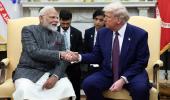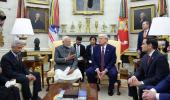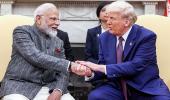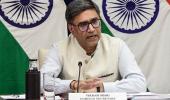'He needs to see results while he is in office.'

"Continued deportations of illegal Indian immigrants could cause friction unless it is handled more thoughtfully in the future....India will need to work hard to keep the Trump administration happy on trade policy issues," Richard Rossow tells Nikhil Lakshman in an email interview, assessing the impact and outcome of Thursday's Modi-Trump meeting in the White House.
Mr Rossow is the Chair on India and Emerging Asia Economics at the Center for Strategic and International Studies, the Washington, DC-based think-tank. He has been working on US-India relations for over 25 years, first as director for South Asia at McLarty Associates, then as deputy director of the US-India Business Council.
What is your verdict on the Modi-Trump meeting in the Oval Office? Was it a success for Mr Modi and India?
The meeting went better than expected.
India held back from offering new trade concessions, beyond those in the February 1 Union Budget. A trade deal will presumably help manufacturers in both nations.
The US agreed to look at expanded security cooperation in the Indian Ocean. And India may get access to sensitive warfare technologies that had been embargoed including fifth generation fighters and undersea combat platforms.
One retired Indian diplomat argues that President Trump unsettled Prime Minister Modi by outlining his tariff plan 90 minutes before their meeting in the Oval Office.
Do you believe this was intended to pre-empt Mr Modi's 'planned charm offensive to dissuade Mr Trump from imposing tariffs on Indian products'? Or is much being read between two disconnected events?
The tariff plan has been in the works for some time. We have tariff or immigration announcements every few days, so this would have been hard to avoid.
Luckily, yesterday's announcement did not put new tariffs on Indian goods directly, as was feared. It leaves room for studying the issue, negotiations, and perhaps some additional policy relaxations in India.
Was there any danger, any possibility of a setback in the India-US relationship in Trump 2.0?
Did India dodge that bullet by offering to buy American oil, American weapons and earlier toning down tariffs that would affect the import of American goodies in the Budget two weeks ago?
President Trump still thinks of Prime Minister Modi as a 'tariff king'. I suspect the Trump administration's global tariff review will ultimately target India for retaliatory tariffs at some point this year.
Continued deportations of illegal Indian immigrants could cause friction unless it is handled more thoughtfully in the future. And we still have the 'murder for hire' case playing out in the Southern District Court of New York, which kicks up negative sentiments as new details come to light.
But other pain points may be less prominent in the coming years such as our differing approaches to Russia's invasion of Ukraine.

Is the symbolism of the relationship intact? Would you credit Prime Minister Modi's personal relationship with President Trump as being the swing factor?
India has managed the relationship deftly. Both times President Trump was elected India chose to engage the administration early. Last time, India was slow to respond to the Trump administration's demands for trade concessions and the two leaders engaged in a medium-intensity trade fight. This time India is being more proactive on trade and investment issues.
One heard only about trade from the meeting. Does that mean that trade talk dominated the discussions and strategic objectives were pushed to the background?
Was that because New Delhi and America know what the strategic relationship is all about, and it can only be enhanced by defense purchases and sanctions for high tech?
The Joint Statement actually led with defense content. This includes sharing advanced weapons systems, some areas of co-production, operational coordination, exercises, and more. Defense cooperation remains the most positive element of our government-to-government engagement.
Was this visit more about relationship management, setting the direction of the relationship during this administration's tenure in office, rather than about a big ticket event like say the nuclear deal of July 2005?
It is early, so concrete outcomes would have been hard to generate. But launching trade agreement talks and outlining a pathway for the US to share our most advanced stealth fighter and undersea combat systems is quite historic. We will have to check in at the end of the year to see if these workstreams progress.

In your assessment, what are the win-wins for either side from Thursday's encounter in the White House?
From a US perspective, we have a commitment by India to remove remaining impediments to nuclear trade. A trade deal would likely confer more market access benefits on American firms. India will augment purchases of American hydrocarbons and defense materiel.
From an Indian perspective, they have the promise of co-production of advanced defense equipment. The United States will review its defense export controls. Advanced weapons systems like stealth fighters are not 'officially' on the table for discussions.
And the US recognizes the worsening security situation in the Indian Ocean. And it was good to see the Trump administration pledge efforts to improve the processes around immigration for students and skilled workers.
Ashley Tellis has spoken of America's 'strategic altruism' defining the US relationship with India.
Under Trump 2, would that credo be abandoned for a more transactional relationship between India and the US -- you give us this, then we may consider giving you that?
Would this unsettle the established-since-2005 India-US equation?
I do agree that 'strategic altruism' is taking a pause. President Trump does not want to wait for the benefits of a long-term partnership. He needs to see results while he is in office. But there are gains to be had on both sides.
India is in a good position to push for relaxing US defense export controls since it would lead to increased defense exports.

What are the strategic objectives the Trump administration expects from India in the four years it will be in office?
During these four years India will surpass both Germany and Japan to become the world's third-largest economy. This makes India an undeniably large market for US exports and for attracting investments into the United States. And India provides a critical hedge against China's increasing belligerence.
Do you think the issues that hobbled the relationship during the latter half of the Biden administration like the Pannun conspiracy will be resolved/overlooked by the Trump administration?
I do not believe the relationship was 'hobbled' by these issues. They are real and were on the table, but looking back at the Biden administration, we saw the White House continue to push American companies in strategic industries to 'friendshore' to India, and our militaries had step change progress in our interoperability through actions like India joining Combined Maritime Forces Bahrain, Indian shipyards authorized to do repair work on US navy vessels, coast guard exercises in the Andaman Sea, and more.
But yes, I do suspect the Trump administration will decrease its focus on social issues overseas.

Were you impressed by how much India was willing to engage with Trump on trade to elude any land mines that could undermine the relationship?
Not entirely. As already noted, the Union Budget had several areas of customs duty reductions. But the Joint Statement did not include any new provisions to relax trade restrictions nor major new purchases of American goods. That surprised me to some extent.
Could a better trade relationship ensure a better security relationship? Will India have to keep giving to ensure that its strategic relationship with the US stays intact and keeps growing?
Stronger trade ties certainly support security ties. We care about the security of our major trading partners. American jobs are at stake. I do agree that India will need to work hard to keep the Trump administration happy on trade policy issues.
Let us hope the trade agreement talks progress fast and provide a sweeping tool to remove some of the remaining obstacles, and that the Trump administration will consider using these talks to relax issues like immigration on the American side, too.
Can we say the relationship, which seemed to be in uncertain waters during the last 18 months, is on its way to being towed to a more placid seas?
I totally disagree that the relationship was in uncertain waters. Look at the outcomes I noted earlier and the heavy, senior-level engagement between our nations even after the election. This is unprecedented.
But I do expect President Trump will build on it further, certainly on security. And, from this meeting, perhaps even on commercial ties.
Photographs curated by Manisha Kotian/Rediff.com and Satish Bodas/










 © 2025
© 2025